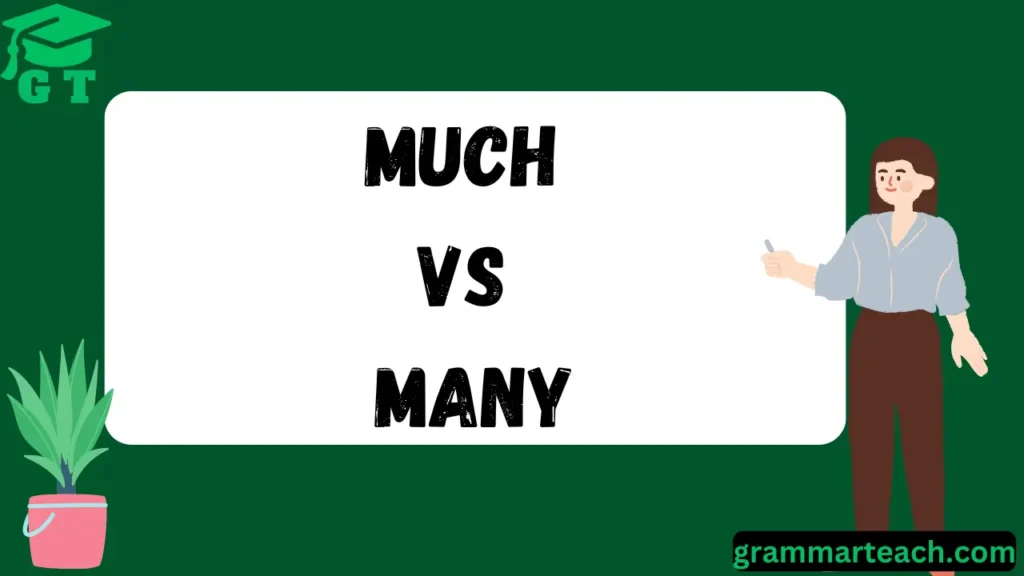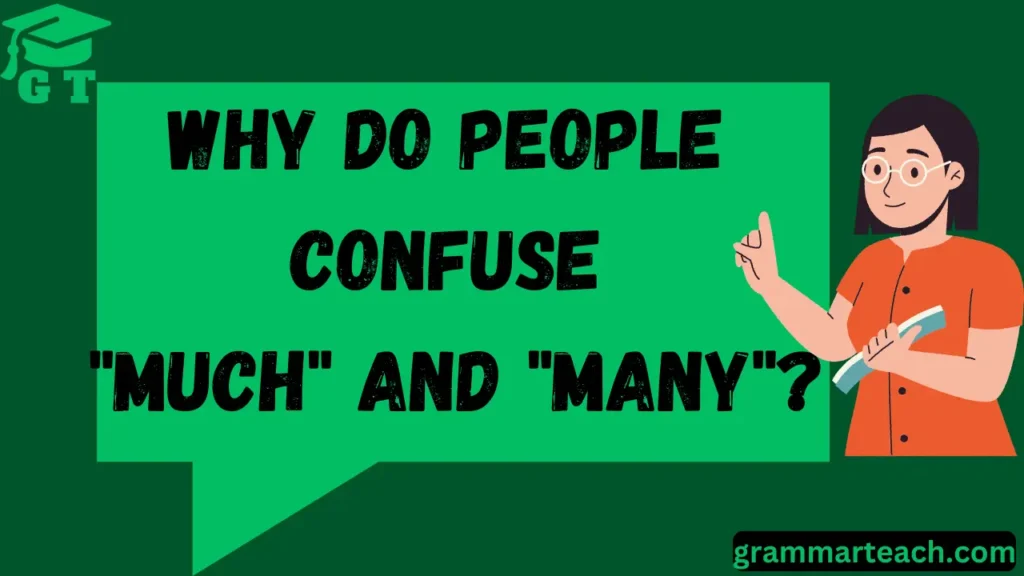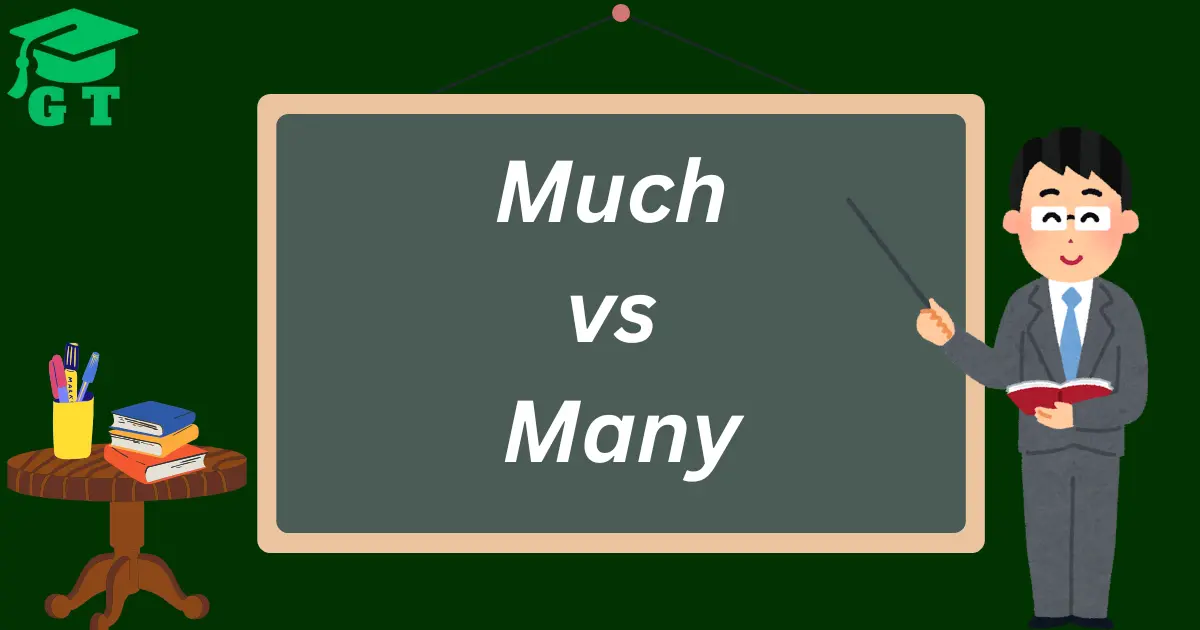Have you ever been confused about when to use “much” vs “many”? You’re not alone! Many English learners struggle with these words because they both refer to quantity but are used differently. The key is understanding whether a noun is countable or uncountable, and this article will break it down in a simple way.
In this guide, we will explore the key differences between “much” vs “many,” provide clear examples, and give you helpful tips to remember when to use each word. We’ll also include tables and exercises to make learning easy and fun!
Much vs Many – What’s the Difference?

Both “much” and “many” mean a big amount of something. But the key difference is:
“Much” is used with uncountable nouns (things you cannot count one by one).
“Many” is used with countable nouns (things you can count one by one).
Word Origins
“Much” comes from Old English mycel, which means “big amount.”
“Many” comes from Old English manig, meaning “a large number.”
Common Mistakes
Many learners make mistakes by using “much” with countable nouns or “many” with uncountable nouns. This is incorrect!
Additionally, some learners avoid using “much” in positive sentences because it is more common in negatives and questions. However, “much” can still be used in positive sentences, especially in formal writing. For example:
“She has much experience in this field.”
“There is much excitement about the new movie.”
Another mistake is forgetting that “many” always needs a plural noun. Saying “many child” is incorrect; it should be “many children.”
Understanding these mistakes will help you use “much” and “many” more confidently!
What Is “Much”?
Definition:
“Much” means a large amount of something that cannot be counted.
Usage in Sentences:
I don’t have much time to play.
Is there much water in the glass?
We ate too much candy.
There is so much noise outside.
He has much love for his family.
Read More: Buses or Busses: Learn the Correct Spelling & Meaning Easily
Where to Use “Much”
| Situation | Correct Usage of “Much” |
| Talking about liquids | “I drank too much juice.” |
| Talking about time | “We don’t have much time left.” |
| Talking about money | “He doesn’t have much money.” |
| Negative sentences | “There isn’t much sugar in the tea.” |
| Questions | “How much salt do we need?” |
What Is “Many”?
Definition:
“Many” means a large number of things that can be counted.
Usage in Sentences:
There are many toys in the room.
How many apples are in the basket?
I have many friends at school.
She visited many countries last year.
He knows many interesting facts.
Where to Use “Many”
| Situation | Correct Usage of “Many” |
| Talking about objects | “I have many books.” |
| Talking about people | “Many children like ice cream.” |
| Talking about places | “There are many parks in this city.” |
| Negative sentences | “Not many students came today.” |
| Questions | “How many chairs are in the room?” |
Key Differences Between “Much” and “Many”
| Feature | Much | Many |
| Type of noun | Uncountable | Countable |
| Used in | Negative & questions | All sentences |
| Example | “There isn’t much water.” | “There are many bottles of water.” |
| Common mistakes | ❌ “Much apples” (wrong) | ❌ “Many sugar” (wrong) |
Example Scenarios to Show the Difference
Food & Drinks
Incorrect: I ate too many rice. ❌
Correct: I ate too much rice. ✅
Incorrect: I drank much cups of tea. ❌
Correct: I drank many cups of tea. ✅
Shopping
Incorrect: I bought much dresses. ❌
Correct: I bought many dresses. ✅
Incorrect: I don’t need many sugar. ❌
Correct: I don’t need much sugar. ✅
School & Learning
Incorrect: She has much books in her bag. ❌
Correct: She has many books in her bag. ✅
Incorrect: I don’t have many homework. ❌
Correct: I don’t have much homework. ✅
Why Do People Confuse “Much” and “Many”?

Similar meaning – Both mean “a big amount.”
Not knowing countable vs uncountable nouns – Some people don’t know which nouns to count.
Translation issues – Some languages don’t have different words for “much” and “many.”
Avoidance in speech – Some people avoid “much” in positive sentences, thinking it sounds unnatural.
Synonyms & Antonyms
| Word | Synonyms | Antonyms |
| Much | A lot, plenty, loads | Little, a bit |
| Many | Several, numerous, a lot | Few, not many |
Quick Tips to Remember
If you can count it, use “many.”
✅ “How many chairs are there?”
❌ “How much chairs are there?”
If you cannot count it, use “much.”
✅ “How much rice do we have?”
❌ “How many rice do we have?”
Use “many” with plural nouns.
✅ “There are many apples.”
❌ “There is many apples.”
Use “much” with singular uncountable nouns.
✅ “There isn’t much milk.”
❌ “There aren’t much milk.”
Read More: Grammar or Grammer: Learn the Right Spelling & Easy Tricks!
Final Thoughts
Understanding when to use “much” vs “many” is simple once you remember the difference between countable and uncountable nouns. If you can count individual items, use “many.” If the noun refers to something that cannot be counted separately, use “much.” Practicing with examples will help you build confidence in using these words correctly.
Mistakes happen, but with the right knowledge, you can avoid them! Next time you’re speaking or writing, try using “much” and “many” in your sentences. The more you practice, the easier it will become. Keep learning and improving your English skills!


